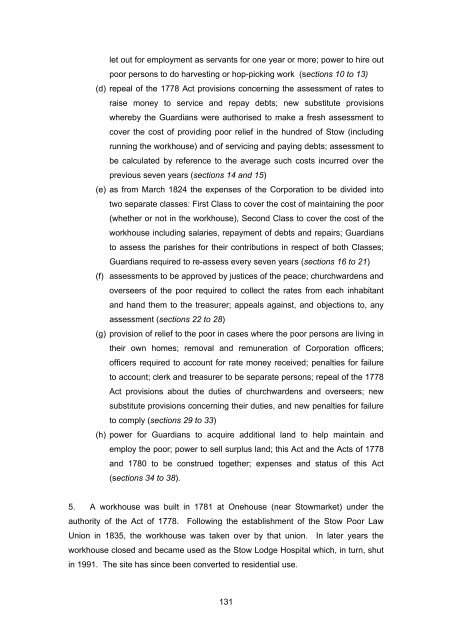Poor Relief - Law Commission
Poor Relief - Law Commission
Poor Relief - Law Commission
Create successful ePaper yourself
Turn your PDF publications into a flip-book with our unique Google optimized e-Paper software.
let out for employment as servants for one year or more; power to hire out<br />
poor persons to do harvesting or hop-picking work (sections 10 to 13)<br />
(d) repeal of the 1778 Act provisions concerning the assessment of rates to<br />
raise money to service and repay debts; new substitute provisions<br />
whereby the Guardians were authorised to make a fresh assessment to<br />
cover the cost of providing poor relief in the hundred of Stow (including<br />
running the workhouse) and of servicing and paying debts; assessment to<br />
be calculated by reference to the average such costs incurred over the<br />
previous seven years (sections 14 and 15)<br />
(e) as from March 1824 the expenses of the Corporation to be divided into<br />
two separate classes: First Class to cover the cost of maintaining the poor<br />
(whether or not in the workhouse), Second Class to cover the cost of the<br />
workhouse including salaries, repayment of debts and repairs; Guardians<br />
to assess the parishes for their contributions in respect of both Classes;<br />
Guardians required to re-assess every seven years (sections 16 to 21)<br />
(f) assessments to be approved by justices of the peace; churchwardens and<br />
overseers of the poor required to collect the rates from each inhabitant<br />
and hand them to the treasurer; appeals against, and objections to, any<br />
assessment (sections 22 to 28)<br />
(g) provision of relief to the poor in cases where the poor persons are living in<br />
their own homes; removal and remuneration of Corporation officers;<br />
officers required to account for rate money received; penalties for failure<br />
to account; clerk and treasurer to be separate persons; repeal of the 1778<br />
Act provisions about the duties of churchwardens and overseers; new<br />
substitute provisions concerning their duties, and new penalties for failure<br />
to comply (sections 29 to 33)<br />
(h) power for Guardians to acquire additional land to help maintain and<br />
employ the poor; power to sell surplus land; this Act and the Acts of 1778<br />
and 1780 to be construed together; expenses and status of this Act<br />
(sections 34 to 38).<br />
5. A workhouse was built in 1781 at Onehouse (near Stowmarket) under the<br />
authority of the Act of 1778. Following the establishment of the Stow <strong>Poor</strong> <strong>Law</strong><br />
Union in 1835, the workhouse was taken over by that union. In later years the<br />
workhouse closed and became used as the Stow Lodge Hospital which, in turn, shut<br />
in 1991. The site has since been converted to residential use.<br />
131
















